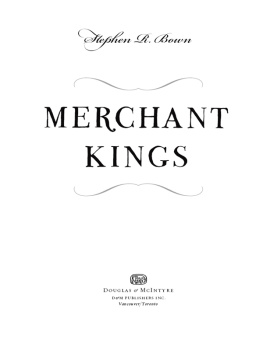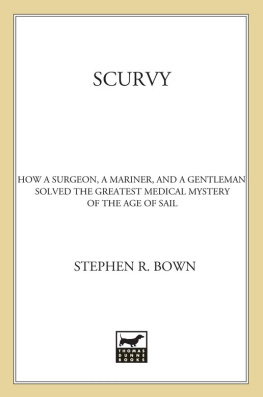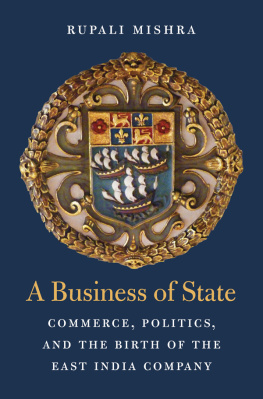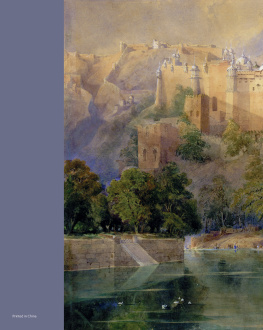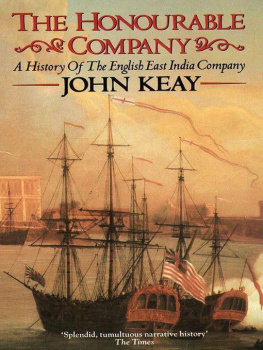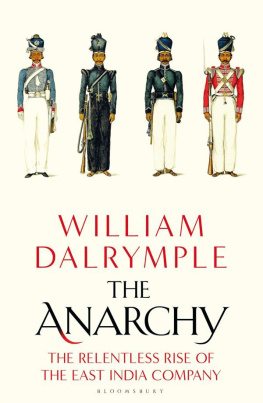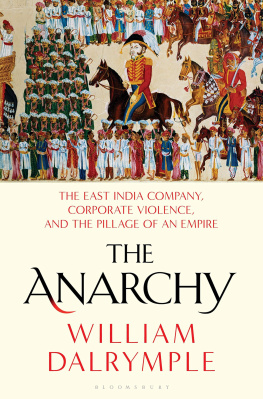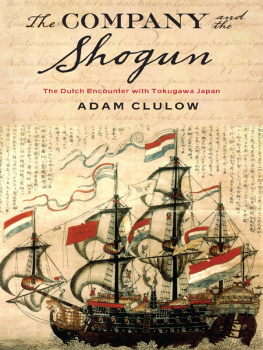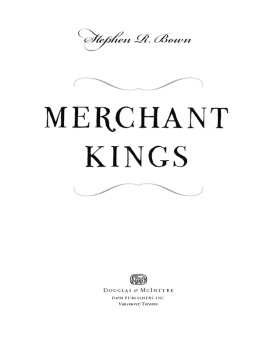Merchant kings
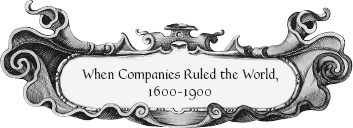
Stephen R. Bown

MERCHANT
KINGS


Copyright 2009 by Stephen R. Brown
09 10 11 12 13 5 4 3 2 1
All rights reserved. No part of this book may be reproduced, stored in a retrieval system or transmitted, in any form or by any means, without the prior written consent of the publisher or a licence from The Canadian Copyright Licensing Agency (Access Copyright). For a copyright licence, visit www.accesscopyright.ca or call toll free to 1-800-893-5777
Douglas & McIntyre
A division of D & M Publishers Inc.
2323 Quebec Street, Suite 201
Vancouver bc Canada v5t 4s7
www.dmpibooks.com
Library and Archives Canada Cataloguing in Publication
Bown, Stephen R
Merchant kings : when companies ruled the world, 1600-1900 /Stephen R. Bown. Includes bibliographical references and indexes.
ISBN 978-1-55365-342-4
1. Colonial companiesHistory. 2.MerchantsEuropeBiography.
3 . EuropeCommerceHistory. 4 . Monopolies EuropeHistory.
5. MonopoliesHistory. 6. International business enterprisesHistory.
7. International trade History. 1. Title
HF481.B72 2009 382.09 C2009-902939-1
Editing by John Ecrkcs-Mcdrano Copy editing by Michael Mundhcnk Jacket and text design by Naomi MacDougall Maps by Eric Leinbergcr Jacket illustration Marv Evans Picture Library All other illustrations public domain, courtesy of the author
Printed and bound in Canada bv Friesens Printed on acid-free paper that is forest friendly (100% post-consumer recycled paper) and has been processed chlorine free or printed on paper that comes from sustainable forests managed under the Forest Stewardship Council Distributed in the U.S. by Publishers Group West.
We gratefully acknowledge the financial support of the Canada Council for the Arts, the British Columbia Arts Council, the Province of British Columbia through the Book Publishing Tax Credit, and the Government of Canada through the Book Publishing Industry Development Program (BPIDP) for our publishing activities.
Contents
Introduction
THE AGE OF HEROIC COMMERCE
Jan Pieterszoon Cocn and the Dutch East India Company
Pieter Stuyvesant and the Dutch West India Company
Sir Robert Clive and the English East India Company
Aleksandr Baranov and the Russian American Company
Sir George Simpson and the Hudson's Bay Company
Cecil John Rhodes and the British South Africa Company
Epilogue
WHEN COMPANIES RULED THE WORLD
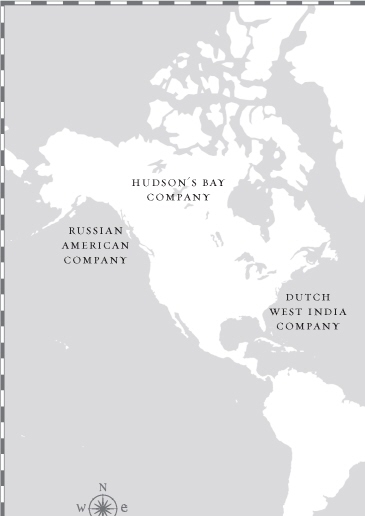
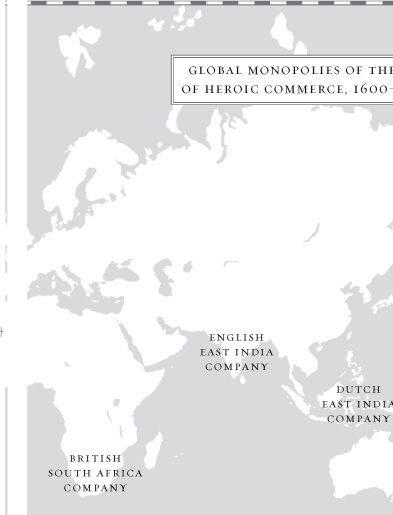
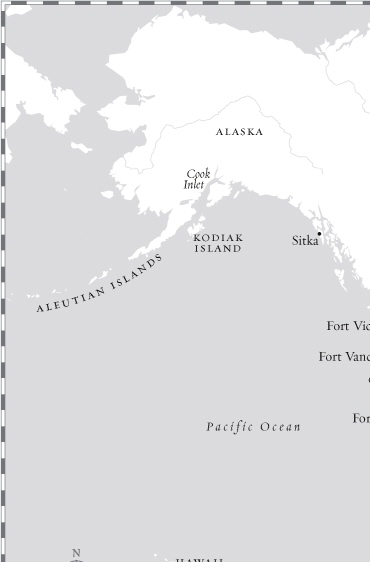
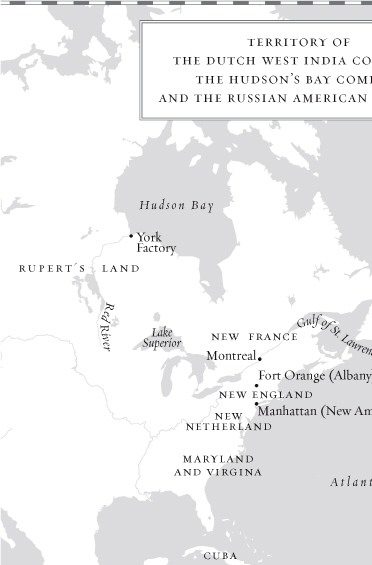

Introduction
THE AGE OF HEROIC COMMERCE
"Whosoever commands the trade of the world, commands
the riches of the world and consequently the world itself."
SIR WALTER RALEIGH, C. l600
FROM THE EARLY 1600S TO THE LATE 1800S, MONOPoly trading companies were the unofficial agents of European colonial expansion. They seized control of vast territories and many peoples, acquiring a variety of governmental and military functions in the wake of their commercial success. For European nations, granting monopoly trading rights to these companies was a convenient way of bankrolling the astronomical cost of colonial expansion. This tapping of private capital spurred what became known as the Age of Heroic Commerce. As each of these privileged enterprises grew, it first assumed civil authority over all Europeans in its employment overseas and then expanded this authority by subjugating local peoples. In working towards their political objectives, the merchant trading companies maintained their own police forces and, sometimes, standing armies, and either controlled the local governments or became the sole government of their territories. These territories were managed as business interests, in which people were considered as either employees, customers or competitors. Beginning as traders, the leaders of these companies, "the merchant kings," ended up with dictatorial political power over millions of people. This book is an account of six of these merchant kings and their impact.
Jan Pieterszoon Coen was the ruthless pioneer of the India Company, a trading enterprise that within decades was in conflict with nearly every maritime world. During his reign, the company became the for the wealth of the Netherlands golden age by supplying of Europe with exotic spices. Despair not, he proclaimed letter to his subordinates in 1618. Spare your enemies God is with us. Sometimes his enemies were his when they did not want to trade with his agents or wares of his rivals, the English or the Portuguese, his companys troops to attack. He tolerated neither nor challenges to his authority.
The one-legged Pieter Stuyvesant was the autocratic of the Dutch West India Companys colony For decades he resisted all attempts by the increasing of non-employee citizens of the expanding colony responsible government. Stuyvesant ultimately placed interests ahead of those of his country, an resulted in the loss of the entire territory of New to a foreign power. When during the third Anglo-British war ships anchored off Manhattan offered of New Netherland civil government if they surrendered, entire militia laid down their arms without firing
Despite having no formal training, Clive was a military genius who transformed the company's fortunes with a series of astonishing military victories, using company troops, over the French East India Company and various local rulers in India during the dying days of the Mughal Empire. He created the foundation for the English East India Company's wealth and political power-after Clive s work, the company was both a monopoly trading enterprise and a civil and taxation authority ruling over thirty million people. Clive later was made a baron and became one of the wealthiest men in Britain. When, in 1772, he was questioned by Parliament about his possible corruption and the sources of his wealth, he indignantly proclaimed: "I stand astonished at my own moderation."
Aggressive and efficient, Akksandr Andreyevich Baranov was an itinerant Russian merchant and trader who first migrated east to Siberia, then to Alaska. In 1799 he assumed command of the Russian American Company, a semi-official monopoly colonial trading company chartered by Czar Paul 1. Baranov pushed Russian enterprise and colonization further south along the Alaskan coast, warring both with First Nations and with competing Russian businesses in the name of his company. In 1804, firing from a Russian warship, he bombarded a Tlingit village for days, forcing the Tlingit to accept the authority of the Russian American Company. He died after twenty-seven years of solidifying his country's territorial claims on the frontier and extracting vast quantities of sea otter furs for the company's shareholders and directors in St. Petersburg.
Next page
